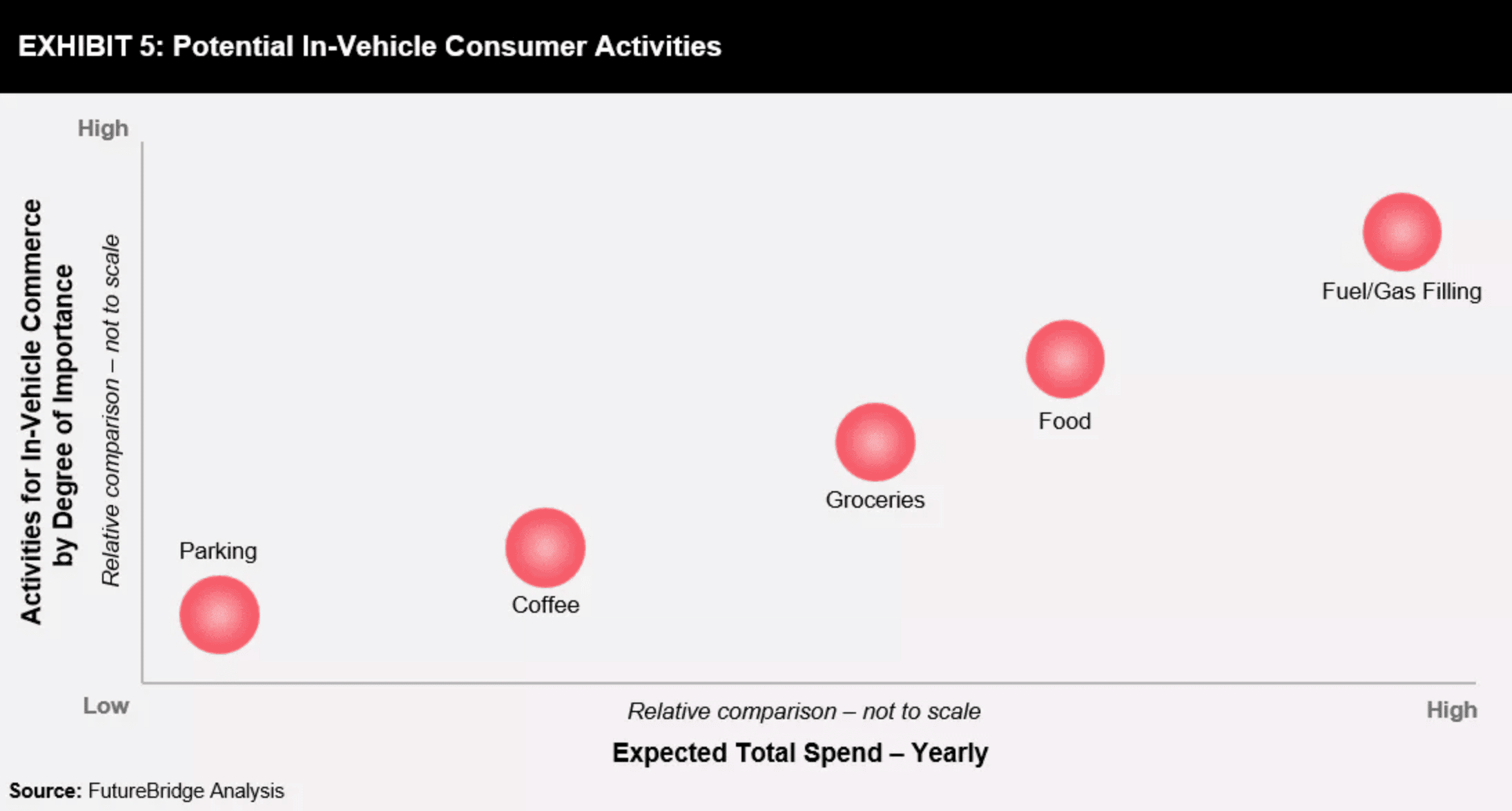What Is In-Car Commerce and How Can You Benefit From It?
09/12/22
3'
In-Car Commerce, sometimes also referred to as “automotive commerce” or “in-vehicle commerce” describes the use of technology to enable people to shop, pay, and receive services while in their cars. This could include things like ordering food or drinks to be delivered to your car while you are parked at a restaurant, or using your car’s infotainment system to shop for products and services and make payments. The idea of in-car commerce is still being researched and tried by businesses in the automotive and technological sectors.
In-car payment value could be around $86 billion in less than five years, and the market is predicted to be worth more than $625 billion by 2030.
In-car commerce: what are the developments?
In-car commerce is a relatively new concept, and it is still being developed and tested by companies in the automotive and technology industries. In order to be commerce-ready a vehicle must be connected. Generally speaking, this refers to a vehicle that can connect to the internet. More and more cars are being connected nowadays. According to a McKinsey research by 2030, nearly 95% of new automobiles sold globally will be connected, up from around 50% currently.
Future innovations and improvements in in-car commerce could include some of the following:
- Development of more sophisticated in-car payment systems, such as biometric authentication and secure payment methods
- Expansion of the range of goods and services that are available for in-car purchase, including things like groceries, fuel, and car maintenance services
- Integration of in-car commerce with other technologies, such as voice assistants and augmented reality, to make the shopping experience more seamless and convenient
- Improved integration of in-car commerce with existing payment systems, such as mobile wallet apps and online payment platforms
What are the limitations of in-car commerce?
Given that in-car commerce is a very young and fast-developing industry, it is difficult to determine with certainty what its boundaries may be. It’s still a possibility that in-vehicle commerce will not be as widely adopted as thought. This could be because the consumer experience isn’t good enough and the demand from shoppers just isn’t there.
Moreover, there may be some restrictions or difficulties in the creation and application of in-car commerce. These issues include security and privacy concerns, technological limitations, and regulatory hurdles.
As with any online transaction, in-car commerce raises concerns about the security of personal and financial information. Companies will need to develop secure payment systems and protect customers’ data to avoid fraud and identity theft.
This new commerce concept also relies on advanced technology to enable payment and delivery of goods and services. If the technology is not reliable or efficient, it could hinder the adoption and growth of in-car commerce.
Last but not least, in-car commerce may be subject to various regulations and laws, depending on the country and region where it is being implemented. Companies may need to navigate complex legal frameworks to ensure that their in-car commerce systems comply with local regulations.
How can brands benefit from in-car commerce?
Brands can potentially benefit from in-car commerce in several ways.
First of all, it offers brands the opportunity to reach consumers in a new and potentially untapped market. By making their products and services available for in-car purchases, brands can potentially increase their sales and revenue.
Furthermore, in-car commerce allows brands to connect with customers in a more personal and convenient way. By providing services and products that are tailored to the specific needs of in-car consumers, brands can enhance their engagement with customers and build stronger relationships.
This commerce concept also opens up new opportunities for brands to explore partnerships and collaborations with other companies in the automotive and technology industries. By working together, brands can develop innovative products and services that meet the new needs of in-car consumers.
Your e-commerce library
E-commerce for Retailers
Learn moreE-commerce for Brands
Learn moreL'Oréal Luxe Success Story
Learn moreSign up for our newsletter
By submitting this form you authorize Lengow to process your data for the purpose of sending you Lengow newsletters . You have the right to access, rectify and delete this data, to oppose its processing, to limit its use, to render it portable and to define the guidelines relating to its fate in the event of death. You can exercise these rights at any time by writing to dpo@lengow.com

Trending Posts
Marketing channels
Where does Gen Z shop online?
Gen Z online shopping is transforming the digital marketplace, setting trends that redefine what it means to engage with brands…
16/04/24
9'
Marketplaces
The Top 10 Marketplaces in Europe
The e-commerce scene is a vibrant mix of marketplaces in Europe. These aren't just websites; they're bustling hubs where millions…
08/12/23
7'
Marketplaces
Lengow Now Fully Supports Zalando Logistics Solutions ZSS and ZRS
Zalando, one of Europe’s leading fashion marketplaces, continues to raise the bar with its advanced logistics and fulfillment programs. After…
12/12/24
4'
Marketplaces
How to win the Buy Box on Marketplaces (Amazon, Zalando, etc.)
What is the most important thing for marketplace sellers? Exactly, the Buy Box! If you don't have the Buy Box…
02/04/24
10'
Marketplaces
How to Sell on Temu? Best Tips
Emerging under the vast umbrella of PDD Holdings Inc., Temu has skyrocketed in popularity as a shopping sensation from China…
17/08/23
5'





